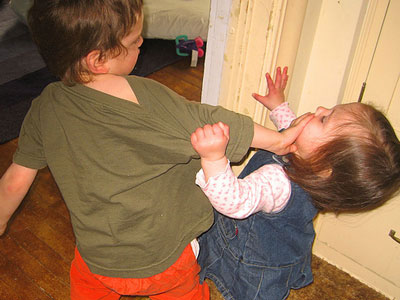Fighting and quarreling is common amongst children. Children may fight with each other due to various reasons. However, parents can help children to control their aggressive behaviour. Read on to find more about why children fight and how parents can help them to avoid fighting. Parents want to see their children having good coordination and wish to see them love each other. However, sibling rivalry or fights amongst children are unavoidable yet parents find it very hard to see their children fighting. In fact, sibling rivalry or fights between children should not be seen in a negative way because it gives a chance to each child to compromise, adjust with others and at the same time stand out for themselves too. Families having more than one child experience sibling rivalry. It is on the part of the parents what they should do, where they should intervene and where they need to leave them settle down on their own. Remember, as a parent you should interfere only when the fighting get physical or you see verbal abusing. Fighting between two children occur, usually, when one gets frustrated or angry. They might start hitting, throwing things or yelling at each other. Children need to learn to deal with anger and they must be taught about what is acceptable and what is not as soon as possible. How children handle their anger depends largely on the type of response they get from their parents. In this articleWhy Children FightHow to Reduce and Deal with FightingWhy Children Fight Here are few reasons due to which children fight with each other. Changing needs – The demands, likes and dislikes of children go on changing as they grow. So, reasons behind fights differ according to age. A toddler will react when anyone touches his toy while a teenager will react on taking care of their younger ones. Individual Nature and Temperament – The personality of your kid matters a lot, how he gets along with others right from the beginning of his life. This includes mood, outlook and adaptability. Sick Kids or Kids with Special Needs – Usually kids who have been sick for long or suffer from special needs get more attention from parents. This is one of the major causes behind fight between the two children often. Paradigms – The way parents solve problems between two children create an image of ideal way to fairness in the minds of the two children. They also see the ways their parents deal with problems and try to implement that in their daily life. How to Reduce and Deal with Fighting Follow these tips to reduce and deal with fights between children. Teach and encourage children to play cooperatively. Explain them the rules like taking turns, keeping off hands and feet and being gentle and polite to each other. Teach children to solve their problems on their own and teach them how to take care of other’s interests too. If you find your child is getting aggressive, intervene immediately. Ask them to stop being violent and destructive and also ask them to play nicely. If the fight does not stop, separate them and tell them you would declare the time out for playing. After the declared quiet time, let them regain playing. Praise them for following your advice. You can also join them actively so that they play cooperatively. Follow the advice and guidelines and you will find that you can easily minimise the fighting between your children. Just be patient, get involved at times actively with them and play. This will not only give them confidence and feeling of coordination, but also help them get quality time with their parents. Even though you find your children fighting often, remember you should deal with it patiently. Do not forget that they will take your words as decision and parents are role model for their children. Also, be fair to your children and bear in mind, it takes two to fight.
Fighting and quarreling is common amongst children. Children may fight with each other due to various reasons. However, parents can help children to control their aggressive behaviour. Read on to find more about why children fight and how parents can help them to avoid fighting. Parents want to see their children having good coordination and wish to see them love each other. However,
sibling rivalry or fights amongst children are unavoidable yet parents find it very hard to see their children fighting. In fact, sibling rivalry or fights between children should not be seen in a negative way because it gives a chance to each child to compromise, adjust with others and at the same time stand out for themselves too.
Families having more than one child experience sibling rivalry. It is on the part of the parents what they should do, where they should intervene and where they need to leave them settle down on their own. Remember, as a parent you should interfere only when the fighting get physical or you see verbal abusing.
Fighting between two children occur, usually, when one gets frustrated or angry. They might start hitting, throwing things or yelling at each other. Children need to learn to deal with anger and they must be taught about what is acceptable and what is not as soon as possible. How children handle their anger depends largely on the type of response they get from their parents.
Why Children Fight
Here are few reasons due to which children fight with each other.
Changing needs – The demands, likes and dislikes of children go on changing as they grow. So, reasons behind
fights differ according to age. A toddler will react when anyone touches his toy while a teenager will react on taking care of their younger ones.
Individual Nature and Temperament – The personality of your kid matters a lot, how he gets along with others right from the beginning of his life. This includes mood, outlook and adaptability.
Sick Kids or Kids with Special Needs – Usually kids who have been sick for long or suffer from
special needs get more attention from parents. This is one of the major causes behind fight between the two children often.
Paradigms – The way parents solve problems between two children create an image of ideal way to fairness in the minds of the two children. They also see the ways their parents deal with problems and try to implement that in their daily life.
How to Reduce and Deal with Fighting
Follow these tips to reduce and deal with fights between children.
- Teach and encourage children to play cooperatively. Explain them the rules like taking turns, keeping off hands and feet and being gentle and polite to each other.
- Teach children to solve their problems on their own and teach them how to take care of other’s interests too.
- If you find your child is getting aggressive, intervene immediately. Ask them to stop being violent and destructive and also ask them to play nicely.
- If the fight does not stop, separate them and tell them you would declare the time out for playing.
- After the declared quiet time, let them regain playing. Praise them for following your advice. You can also join them actively so that they play cooperatively.
Follow the advice and guidelines and you will find that you can easily minimise the fighting between your children. Just be patient, get involved at times actively with them and play. This will not only give them confidence and feeling of coordination, but also help them get quality time with their parents.
Even though you find your children fighting often, remember you should deal with it patiently. Do not forget that they will take your words as decision and parents are role model for their children. Also, be fair to your children and bear in mind, it takes two to fight.


































